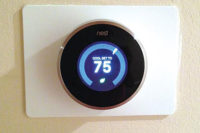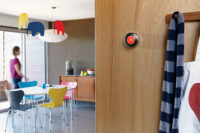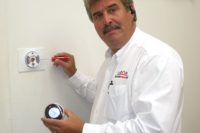Honeywell Intl. Inc., manufacturer of the original round thermostat and long-standing manufacturer of both nonprogrammable and programmable thermostats, recently challenged certain advertising claims made by newcomer and rival Nest Labs Inc., which first began selling its Nest Learning Thermostat™ in late 2011.
In June, the National Advertising Division (NAD), an advertising industry investigative unit administered by the Council of Better Business Bureaus, examined Honeywell’s claims against Nest and issued a decision recommending Nest modify or discontinue certain advertising claims about its product. Nest, though it disagreed with the ruling, agreed to comply.
But the advertising scuffle is not the first time Honeywell and Nest have gone head-to-head in a disagreement, and it will likely not be the last.
Trading Punches
Last February, Honeywell filed suit against Nest for allegedly infringing on seven of their patents, saying “we will continue to protect our intellectual and financial investments in innovation and pursue legal action against those who infringe our patented technologies.” Nest vice president and Apple alumnus Richard “Chip” Lutton countered Honeywell’s claims, saying Honeywell “has a pattern of trying to stifle new market entrants with unfounded legal action.”
In October, the U.S. Patent Office rejected all seven Honeywell patents, though Honeywell told several news outlets that it plans to come back with narrower definitions of the patents for re-examination. Meanwhile, Nest is continuing to sell its thermostat until the matter is resolved, which could take up to two years.
Honeywell’s Challenge
In their most recent disagreement, Honeywell challenged several of Nest’s advertising claims, which include:
• “Only 11 percent of (other) programmable thermostats are programmed to save energy;”
• Eighty-nine percent of other programmable thermostats are not programmed because they are so complicated that most consumers do not bother to program them;
• Other programmable thermostats waste energy;
• “Most thermostats waste 20 percent of your heating and cooling bill. Nest stops the waste;”
• Nest’s “Airwave” feature “automatically lower(s) air conditioning costs up to 30 percent,” and “cuts a/c runtime up to 30 percent;”
• “As you turn on cooling, Nest’s Airwave technology can cut your a/c runtime up to 30 percent;”
• “Nest works in 95 percent of homes with lower voltage systems;” and
• “Adding a common C wire is not required in 99 percent of (Nest) installations.”
Additionally, Honeywell challenged Nest’s claims that each of the following features is “exclusive” to the Nest Learning Thermostat™:
• It works with multiple system types (e.g. forced air, radiant, heat pump, etc.);
• It adjusts heat pump systems to balance efficiency and comfort;
• It adjusts radiant heat systems to give a predictable schedule and even heat;
• It turns heat on “early” to have temperature adjust to a pre-set level by a pre-set time;
• It turns an air conditioner’s compressor off before target temperature is reached;
• It gives notice to change a furnace filter based on system runtime; and
• It incorporates a built-in level to aid in installation.
NAD’s Recommendations
NAD examined Honeywell’s claims and outlined its conclusions in a June 20 press release:
• NAD concluded that Nest provided a reasonable basis for its claim that the Nest Learning Thermostat “works in 95 percent of homes with low-voltage systems.” However, NAD recommended that the advertiser clearly and conspicuously disclose that its claim is based on the results of the data from online users of its “Compatibility Checker;”
• As substantiation for its 11 percent and 89 percent claims, the advertiser relied primarily on a study by the Lawrence Berkeley National Laboratory that concluded that 89 percent of Americans rarely or never program their thermostats to save energy. However, following its review of the evidence, NAD recommended that the advertiser discontinue its unsupported specifically quantified claims that “only 11 percent of (other) programmable thermostats are programmed to save energy,” 89 percent of other programmable thermostats are not programmed because “they’re so complicated that most people don’t bother to program them,” and “other thermostats waste energy;”
• NAD further recommended that the advertiser discontinue the specifically quantified claim that its “Airwave” technology “cuts a/c runtime up to 30 percent,” and the use of a comparative bar graph on its website comparing a/c (compressor) run time without Airwave to a/c (compressor) run time with Airwave; and
• NAD further recommended that the advertiser discontinue its claim that “adding a common C wire is not required in 99 percent of Nest installations.”
Regarding its exclusivity claims, NAD recommended that Nest modify:
• Heat pump balance claims to more accurately convey the message that its heat pump balance feature uses Nest Lab’s exclusive technology (or algorithm), to adjust heat pump systems to balance efficiency and comfort;
• Adjust radiant claims to more accurately convey the message that, rather than being a feature exclusive to Nest, its true radiant feature employs Nest Lab’s exclusive technology or algorithm (which is like no other) to provide a predictable schedule and even heat for homes with in-floor radiant or boiler-and-radiator systems;
• To more accurately convey the message that “early-on,” rather than being a feature exclusive to Nest, employs Nest Lab’s exclusive technology or algorithm that takes into account current real-world weather conditions and what Nest has learned and adapted about a particular user’s individual home through past performance, to calculate the right time to turn on the heating or cooling system; and
• Modify its exclusivity claim with respect to Airwave to limit the exclusivity to its technology that allows for a more variable time period for the fan to operate after the compressor shuts down based on its “learning capability” as outlined above.
Nest has voluntarily discontinued claims that the Nest Learning Thermostat™ “can automatically lower air conditioning costs up to 30 percent,” NAD noted, as well as exclusivity claims regarding its “system match,” “filter reminders,” and “built-in level” features — an action NAD deemed “necessary and appropriate.”
Nest Responds
While Nest representatives de-clined to speak to The NEWS about NAD’s decision, a spokesperson did respond to NAD’s findings in a statement within the full report:
“Nest Labs appreciates NAD’s recognition that the Nest Learning Thermostat provides consumers with advanced and exclusive technology. Nest Labs is disappointed, however, that NAD disagreed with the company regarding consumer interpretation of some of the claim language, and that the voluminous amount of evidence submitted by Nest Labs supporting other claims — such as the addition of a common C wire is not needed in 99 percent of Nest installations — was considered inadequate substantiation for those claims. While we strongly disagree, Nest Labs recognizes the mission of NAD and accordingly intends to modify its advertising taking into account NAD’s recommendations.”
A spokesperson for Honeywell also declined to speak to The NEWS about NAD’s recommendations, except to say she “believes that NAD’s decision and findings speak for themselves.”
Publication date: 8/12/2013
Want more HVAC industry news and information? Join The NEWS on Facebook, Twitter, and LinkedIn today!







Report Abusive Comment